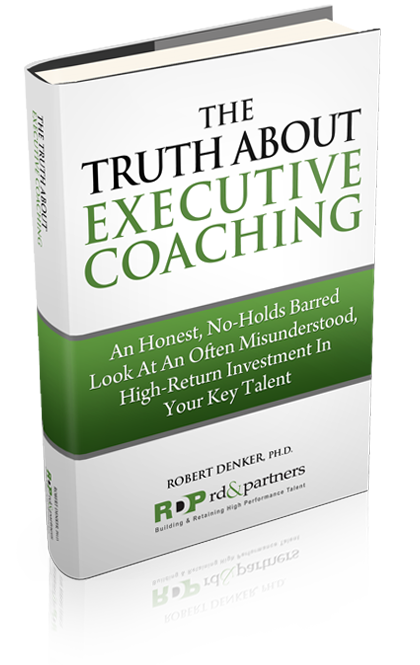Executive Coaching With No Clear ROI and Impact is a Waste
---
Executive coaching has become a cornerstone of today’s leadership development no matter the industry
This is due to the realisation of an effective coaching exercise can be such a transformational process for both the individual leader, their team and the organisation as a whole. An effective executive coaching process provides an opportunity for leaders to realise their blind spots as well as personal growth. At organisational level, Executive Coaching is meant to be a means for improving business results. The challenge however is that in some firms coaching is done for the sake of ticking off the boxes.
In such firms coaching is meant to address what Dr. Robert Denker in his book, The Truth About Executive Coaching calls ‘the mutual satisfaction society,’ where the evaluation of the coaching is merely measured by the personal satisfaction levels of the participant or their superior. Given the level of investment that goes into executive coaching, I would like to argue that more needs to be considered when it comes to such levels of interventions in a Practice. What is your ROI for the executive coaching you are embarking on? Can you you positively quantify impact it is having on your firm or it is simply one of those regular chores carried out as expected?

In today’s environment where on a daily basis leaders have to deal with volatility, uncertainty, complexity and ambiguity (“VUCA”), there is no room or the luxury of carrying out interventions that one cannot measure their Rate of Return. The executive coaching has to be tailor made and contextualised to develop strong leadership that it is designed to produce results and a measurable ROI.
Studies have been done on hundreds of individual coaching engagements encompassing C-suite leaders and the following have been identified as the most-often worked on leadership skills. These include, Treating others with respect, Building Trust, Being able to listen to different Points of Views with an open mind, Delegating more effectively, Standing up to individuals who undermine teamwork, Developing Executive Presence, Presenting your Points of Views persuasively etc. Now imagine the impact of an effective coaching process for these skills on the Practice.
As Dr. Robert Denker, highlights there are some key “truths” about executive coaching. These include that coaching:
• Is a cost-effective investment with a high rate of return
• Must align to business outcomes
• Must involve the leader’s key stakeholders
• Is NOT for everyone
Question is, what does an effective executive coaching do to a leader as an individual, their team and Practice as a whole? An effective executive coaching program helps a leader see him/herself for who they truly are. Generally known as self-awareness. Accurate self-awareness of oneself as a leader is so fundamental for a firm’s effectiveness and profitability. Being able to see oneself clearly as a leader resonates very well with followers. Leaders who lack self awareness have tended to be a disaster in their personal lives and the firms they lead.
Secondly, an effective executive coaching helps the leader be able to see others for who they are. Understanding others is a very crucial tool for effective leadership. Possession of this skill helps a leaders identify the strengths and areas for growth of their team and effectively help the members. An inaccurate assessment of one’s team members can cost the firm ‘big time’ such as when the firm loses an excellent performer simply because their potential was not identified. Similarly, the results can be a disaster when the ‘wrong’ people are appointed to positions of responsibility in the firm. This not only affects team moral but can result in poor execution of key initiatives by the Practice.
Thirdly, an effective coach will help a leader have a new set of skills in handling leadership issues that they will come across as they go up the corporate ladder. In a number of cases people are promoted to C-Suite positions based on their performance at say middle manager level. The skill sets required at executive level are completely different and one needs to be equipped to operate effectively at that new level. While at the previous level one may have excelled because they depended on their own quality of work, the new position requires them to be able to harness the motivation and drive of a team(s). This obviously requires a different skills set which is what an effective executive coaching would provide.

In the diverse workplace that most of the leaders now operate in, there is need be able to build more productive relationships. How does one bring a group of diverse individuals to work together as a team when most of them and even oneself as a leader previously had their own prejudices. An effective executive coach would again help a leader break those barriers and see the value in building productive relationships.
An effective executive coaching exercise also helps a leader realise their hidden strengths and be able to leverage on them. Excellent assessment tools at the beginning of a coaching exercise will bring out those strengths to the fore and form the foundation for building on those strengths for the benefit of the individual executive, their team and their firm.
One effective approach I use that meets all the above and most importantly involves one’s key stakeholders in the effective coaching of a leader is the Marshall Goldsmith Stakeholder Centered Coaching. The question you may ask is, ‘Who are the stakeholders I keep referring to?’ Look at it this way, every leader has a set of stakeholders who are relevant to that leader’s behaviour. The leaders’ behaviour affects these stakeholders and they are clearly beneficiaries of the leader’s effective behaviours. The leader’s behaviour or effectiveness therefore has a bearing on those around him/her. His/her success therefore matters to those Stakeholders who play a crucial part in the effective coaching process of that leader. So, one of the strengths of Marshall Goldsmith approach is that before starting the development process a list of stakeholders is identified and approved.
These stakeholders are then involved throughout the coaching process in terms of providing feedback and feedForward for the leader’s growth. It is these same stakeholders that will also provide the final assessment as to whether the executive coach has been effective or not in bringing about change in the leader. I would like to argue that this aspect of stakeholders involvement is an integral part of the Marshall Goldsmith executive coaching process and makes it one of the most effective approaches in the field.
Furthermore, half way through, and at the end of the assignment, a formal mini-survey is conducted with the Stakeholders to assess the progress made on the development goals chosen by the Leader. This is an anonymous survey that I conduct in order to validate the improvement made by the leader and to measure the change in Stakeholder perception. With the results of the mini-survey, the leader does an After Action Review to pinpoint what happened, why, and what learning to take forward into the future.
An additional aspect that has made me use the Marshall Goldsmith approach is that while most coaching and leadership development focus on a process of feedback as the key to improving, the MGSCC (Marshall Goldsmith Stakeholder Centered Coaching) emphasizes on a process called FeedForward. While feedback is an important part of the 7-step process, FeedForward is a very simple process focusing on suggestions for the future. This greatly helps in developing the leader rather than focusing on feedback based on his/her past behaviour. In a way Feedforward is the reverse exercise of feedback. It's the process of replacing positive or negative feedback with future-oriented solutions. It helps people involved in the coaching process envision and focus on a positive future, not a failed past.
So my view is that the skills I referred to earlier on as some of the most sought after executive coaching skills we deal with and others combined with the effective tools of the MGSCC measurements, gives the Practice an attractive ROI from executive coaching. In today’s environment one needs tools and approaches that have no guess work in them. Tools, approaches, methodologies for developing a team have to have been tried and tested. A firm cannot experiment with building its ‘A’ team. Again it is from putting in place the right tools and systems that some firms win and some lose in the marketplace.
Related links
Main menu






